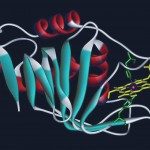Link to Pubmed [PMID] – 14585544
Biochimie 2003 Aug;85(8):771-6
The intracellular parasite Theileria parva (T. parva) can infect bovine B and T-lymphocytes. T. parva-infected cells become transformed, and they survive and proliferate independently of exogenous growth factors. In vivo the uncontrolled cellular proliferation associated with lymphocyte transformation underlies the pathogenesis of the disease called East Coast Fever. The transformed state of parasitised cells can be reversed upon elimination of the parasite by specific theilericide drugs. In this study we found that elimination of the parasite by buparvaquone induces apoptosis of transformed B and CD8(+) T-lymphocytes. Apoptosis is accompanied by the activation of caspase 9 and caspase 3 and processing of poly(ADP ribose) polymerase and is inhibited by Z-VAD a general caspase inhibitor. Based on these observations, we propose that the lack of activation of a caspase 9 > caspase 3 > poly(ADP ribose) polymerase pathway is important and protects T. parva-transformed cells from spontaneous apoptosis.

